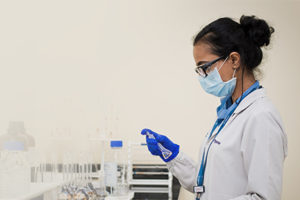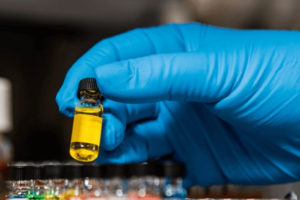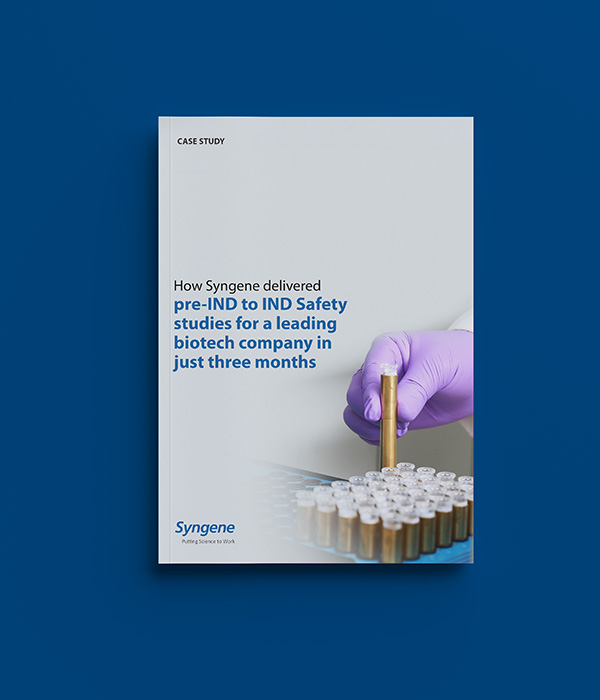Overview
A biotech company had generated a strong pipeline of candidates for gut-brain diseases and was looking for the right preclinical partner for short and long-term SafetyAssessment studies. Syngene’s Safety Assessment team supported the client’s drug development program through multiple exploratory toxicity studies, four IND-enabling safety tox studies, and three 90-day toxicity studies in rodent species. As a result, the biotech company’s Safety Assessment programs advanced from pre-IND to IND in an accelerated time frame of just three months.
About the client
The client is a US-based biotech company engaged in cutting-edge research relating to gut-brain biology. By targeting the bidirectional information highwaybetween the gut and brain, the company hopes to influence the brain centerinvolved in diseases with high unmet needs. Diseases linked to the gut-brain include obesity, diabetes, non-alcoholic steatohepatitis (NASH), functional gastrointestinal disorders, inflammatory disorders, depression, autism, and Parkinson’s disease.
The biotech company had generated a strong pipeline of candidates for gutbrain diseases and was looking for the right preclinical partner for short and long-term Safety Assessment studies. The company evaluated numerous nonclinical CROs before contacting global CRO/CDMO, Syngene. They were looking for a CRO who could support their programs with aggressive timelines. The biotech company audited our Safety Assessment team and selected Syngene based on our scientific expertise, quality of work, and rapid turnaround time. The scope of work included rodent toxicology studies of different durations (7/14/90-days) with support for analytical and bioanalytical components.
The challenges were as follows:
- Starting an IND program in the middle of a pandemic
- Solubility and suspension issues associated with combination studies for two different compounds
- Driving delivery of multiple GLP studies for IND submission with rapid turnaround time
- Imaging the entire gastrointestinal (GI) tract for gross changes, including meticulous microscopic evaluation
- Interpreting study results with appropriate scientific judgment to advance the compounds to the next stage
- Incorporating client feedback for report preparation and delivery
The Solution
The biotech company began its collaboration with Syngene with exploratory toxicology studies. These were short-term studies (in-life phase of 1-2 weeks). We delivered the report well within timelines while meeting quality standards, much to the client’s satisfaction. Based on this positive experience, the company decided to expand the collaboration with Syngene to include IND-enabling studies. This was in March 2020 when several countries suddenly went into lockdown mode to curtail the spread of the COVID-19 pandemic.
Starting an investigational new drug (IND) program during a pandemic presented multiple hurdles. Not at the very least was ensuring an uninterrupted supply of animals, raw materials, and operations necessary to meet stringent regulatory timelines. However, Syngene’s robust business continuity plan convinced the company that their project would be in safe hands, and the contract for IND-enabling studies with signed with us.
The company went on to partner with us for combination studies for two different compounds. The combination studies posed several challenges, such as solubility issues and the inability to suspend two compounds at high concentrations. Both issues required different approaches in order to be resolved. We conducted multiple formulation trials to assess the stability of the compounds. Finally, we achieved the short-term stability of the formulation. We also undertook daily dose administration for a 90-day tox study.
Other scientific complexities
As the studies progressed, the Syngene Safety team had to deal with several scientific complexities. The program involved driving the delivery of multiple good laboratory practices (GLP) studies for IND submission with rapid turnaround time and imaging the entire GI tract for gross changes and meticulous microscopic evaluation – something that requires expertise and extensive experience.
Collaborative efforts of Syngene scientists across functions helped us to deliver all IND-enabling studies on time. The studies included repeat-dose toxicity studies, safety pharmacology studies (CNS and respiratory) in rats, and analytical and bioanalytical studies. The study results had to be interpreted with appropriate scientific judgment to advance the compounds to the next stage. Further, we were required to incorporate feedback from the client to improve the overall process of report preparation and delivery. Syngene successfully incorporated all the feedback as per the client’s specifications.
In addition, we supported the client team with C4 analysis, which serves as a biomarker for bile acid synthesis, and MetID analysis for metabolite profiling and identification of the compound. Once we completed the studies, we delivered the required SEND dataset to the client in just one week (it usually takes two weeks to complete this activity). We also developed and shared the executive summary in electronic common technical document (e-CTD) format for IND submission.
Conclusion
Syngene’s Safety Assessment team supported the client’s drug development program through multiple exploratory toxicity studies, four IND-enabling safety tox studies, and three 90-day toxicity studies in rodent species. As a result, the biotech company’s Safety Assessment programs advanced from pre-IND to IND in an accelerated time frame of three months. Long-term studies are now underway to support future clinical-phase trials and NDA submission.
Currently, in our fourth year of partnership, we look forward to supporting the biotech company on many more toxicity studies and IND and NDA safety tox studies.
To know more about our Safety Assessment services or to contact our experts, please click here.







